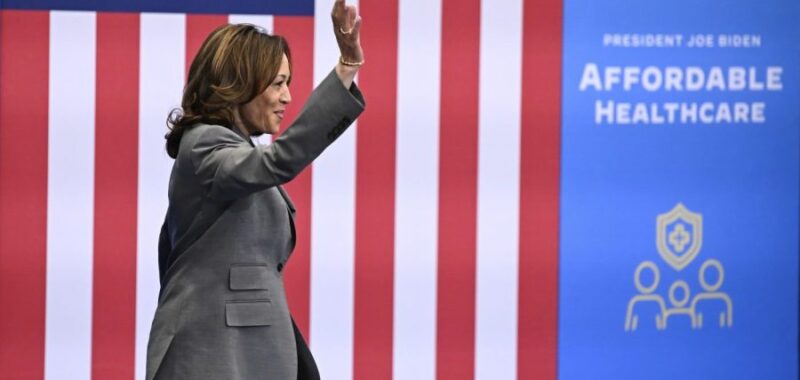
Vice President Kamala Harris’s campaign recently released a lengthy critique of former President Donald Trump’s health care plan. The document not only details Trump’s confusing “concept of a plan,” but highlights an issue we as doctors know all too well: affordability.
As physicians, we are witnessing firsthand how growing health care costs affect average Americans. We see patients suddenly develop life-threatening diabetes complications when their insurance plans stop covering certain medications. We see families incur medical debt due to childbirth complications — and then keep paying off that debt until the child heads off to college two decades later. Health care costs force American families to make heartbreaking choices between their health and other facets of life.
Older Americans are more worried about how the costs of care affect their financial health than about how the quality of care affects their actual health. In a recent University of Michigan poll of over 2,500 older Americans, health care costs — encompassing hospital care, nursing home care, drug costs and dental care — were the top causes for concern about their health.
It’s no secret that U.S. health care spending continues to rise unsustainably. These costs have direct impacts on patients and families, with exorbitant out-of-pocket costs forcing more and more households to incur medical debt. More than 20 million Americans now have overdue medical bills, and 70 percent of them owe more than $1,000. Reports show that nearly half of those with debt are avoiding necessary medical care due to fear of the hefty bills they may receive.
This path is no longer viable, and it seems only Democrats have a plan to prioritize both our financial health and our physical health. Millions of Americans are in desperate need of swift financial support and debt relief. As physicians and researchers who study health care access, we believe affordability is now the most important policy priority within the realm of health care.
Over the past few years, the Biden-Harris administration has taken actual steps, in partnership with state and local governments, to make health care more affordable and to reduce undue and excessive medical debt. For example, President Biden signed into law the No Surprises Act in 2022, which limited out-of-network billing for emergency care. This law now protects patients experiencing medical emergencies from being hit with large, unexpected bills at a time when many have little to no control over where they can seek care. This law not only protects all of us from surprise bills, it is also projected to reduce health insurance premiums for Americans with private health insurance by 1 percent or more.
In the same vein, Harris cast the tie-breaking Senate vote for the Inflation Reduction Act, which now allows the federal government to negotiate prescription drug prices for Medicare directly. Recently, the Department of Health and Human Services announced the first round of negotiated prices, with estimated savings ranging from 38 percent to 79 percent per medication. These common medicines for diabetes, cancer and to prevent blood clots will now be more affordable to Medicare beneficiaries.
The new law also caps the cost of insulin at $35 per month and limits total annual out-of-pocket drug costs to $2,000 per year. For some Medicare recipients, these efforts mean saving nearly $1,000 per person per year. Importantly, the legislation achieves these savings without raising taxes and is expected to reduce the federal deficit by more than $230 billion over a decade. If elected, Harris has said she will pursue extending this drug pricing reform to all Americans, starting with the first 10 drugs selected for the new negotiation program.
Lastly, Democrats have proven committed to reducing existing medical debt for millions of Americans. During its first 100 days in office, the Biden-Harris administration issued an executive order directing federal agencies to reduce medical debt burden on households. Using funds from the American Rescue Plan, the Department of Veterans Affairs canceled nearly $1 billion in co-payments for 1.5 million veterans and eliminated out-of-pocket costs for veterans on VA health care. Harris recently committed to canceling an additional $7 billion in medical debt for 3 million Americans.
Until very recently, medical debt appeared on credit reports, adversely affecting credit scores, which can in turn prevent Americans from securing apartment leases, mortgages, car loans and student loans. Despite the commitment of all three major credit bureaus to remove unpaid medical bills from credit reports, researchers have found that over 215 million Americans still see medical bills on their credit reports. Harris and other Democratic policymakers are now proposing an outright ban on overdue medical bills in credit reports which, if adopted, would raise the credit score of those affected by an average of 20 points.
Thanks to actions taken by the Biden-Harris administration, thousands of Americans have already found letters in their mailboxes informing them that their medical debt has been forgiven. Soon, many more will see their insulin costs drop, while others will see their monthly prescription drug spending decrease. These reductions in the costs we bear as consumers are real and important.
Only one ticket this November — the Harris-Walz ticket — will extend these wins and work to actively improve health care affordability in ways that reduce hardship and advance health for all.
Nishant Uppal, MD, MBA is a resident physician at Brigham and Women’s Hospital and a health care researcher. Kedar Mate, MD is a member of the faculty of Weill Cornell Medicine in New York City. They are members of Doctors for Harris.

